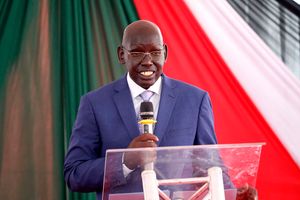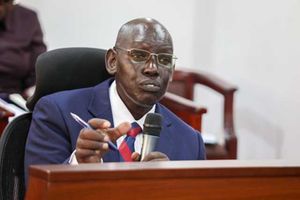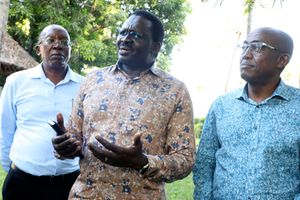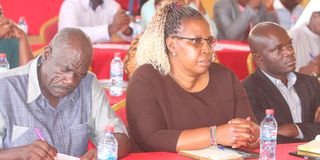
Education stakeholders during Kakamega County during dialogue on education quality and learning outcomes of CBC on March 11, 2025 at Kakamega High School.
Stakeholders in the education sector have questioned the government’s preparedness to roll out senior school in January next year with some issues such as lack of infrastructure, understaffing, insecurity and classification of schools sticking out.
Parents have complained about the implementation of the competency-based curriculum (CBC) and its attendant cost implications.
They spoke during the week-long forums organised by the Ministry of Education in all 47 counties to evaluate the implementation of the CBC as well as appraise draft guidelines for senior school.
"We need urgent improvement to ensure teachers are adequately trained to handle learners. CBC was a rushed programme which was forced on the parents and teachers, but if given time, and all the inputs from every stakeholder considered, then it can help our society,” said Mr John Sawe, a parent who attended the forum at Nakuru Boys High School.
"We also need to re-look at how we can make it cheaper. It is too expensive for parents. The books and the materials needed to facilitate learning are still expensive. All the assignments in CBC involve buying materials for them to either do at home or at school. Most parents are poor and we cannot afford this daily and frequent expenditures,” he added.
During the county dialogue held at St Theresa Girls Secondary School in Kisumu County, some stakeholders noted that a some teachers were ill-prepared to embrace CBC.
"Most of them still use the 8-4-4 curriculum testing method. They still buy commercial tests to give to learners yet the new curriculum is practical," one of the participants said.
Teachers in secondary schools, which will now be referred to as senior schools, have not yet been retooled.
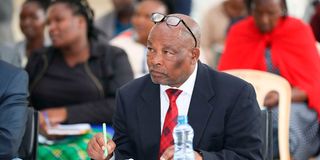
Education stakeholders follow proceedings during CBC Implementation Dialogue Schedule at Nakuru High School on March 10, 2025.
The Ministry of Education Director-General Elyas Abdi, said that the curriculum designs for Grade 10 will be available in schools next month.
Concerns about clarity of the transition from junior to senior school were raised.
"Most people feel the transition is going to create a lot of issues. The criteria that will be used will leave a lot of loopholes," said one parent.
And there are also fears of conflict where parents will want to move their children to schools they prefer at the expense of the performance of the learners.
There is a likelihood of parents looking for schools for their children yet they are supposed to be placed based on their career pathway.
Kenya National Union of Teachers (Knut) West Pokot branch secretary Martin Sembelo said schools along West Pokot, Turkana and Elgeyo Marakwet borders have been affected by conflicts.
“The frequent attacks have led to pupils failing to attend school regularly. Parents have refused to let their children go to school since they fear that they might be attacked,” he said during the county dialogue held at Nasokol Girls Secondary School.
“The only way to bring peace between the two communities is by leaders coming together to solve the dispute to ensure that our people live peacefully,” he said.
Mr Sembelo asked the government to incorporate all schools in lowlands in the county in the school feeding programme. He said there is a shortage of about 4,000 teachers in West Pokot County.
“There are some schools which have only two teachers employed by the Teachers Service Commission (TSC) serving eight classes,” he said.
The county director of education Simon Wamae called on all actors to give education a chance, saying that the government will enforce the law to ensure that every child goes to school.
“We should mobilise ourselves as actors, put our energies together and address challenges hence mobilise resources to support our children,” said Mr Wamae.
Mr Evans Kandie, a teacher from Baringo Central, asked the Ministry of Education to train teachers on how to guide learners in choosing the subjects they should undertake for their career pathways.
Education County Executive Committee Member Simon Kiuta questioned the categorisation of senior schools as either triple or double pathway schools.
“If we look at this system of education, there is some sense that it wants to give every child an opportunity. There is this obsession among Kenyans of wanting to know if a particular school is national one or not. Will it be still there or not and what is the mode of examination?” He asked.
Mr Kiuta spoke at a forum held at Kabarnet Rehabilitation Centre in Baringo County.
At the same time, the Ministry of Education has maintained that the placement to senior school will be fair, transparent and inclusive.
Ministry of Education Secretary administration Florence Amoit said the guidelines for transition to senior school will ensure a smooth process.
Ms Amoit, who spoke in Nakuru, said the guidelines have categorised schools in a flexible manner, based on pathways, accommodation, gender and special needs to ensure that no child will be left behind in the transition.
Rift Valley Regional Director of Education Rosemary Mwambui said the region has a total of 602,407 students in the Grade 9 in 6,948 learning institutions which have junior school.
Kenya Institute of Curriculum Development (KICD) Deputy Director Winrose Rono said that senior school learners are expected to take seven subjects with four core subjects — Kiswahili, English, community service learning and physical education.
At senior school, she said, there will be 40 lessons per week, with the core subjects allocated four lessons.
Reporting by Oscar Kakai, Mercy Koskei, Elizabeth Ojina and Florah Koech

